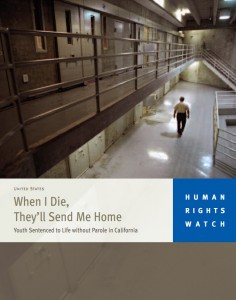California’s ‘Second Chance’ Bill Offers Hope for LWOP Sentenced Youth
 A new proposal in California may provide a second chance for the roughly 227 inmates serving the sentence of life without parole for crimes committed before their 18th birthday.
A new proposal in California may provide a second chance for the roughly 227 inmates serving the sentence of life without parole for crimes committed before their 18th birthday.
Under California’s Senate Bill 9, inmates sentenced to life without parole (LWOP) for crimes committed as a juvenile have the option to submit a petition for consideration of a new sentence after serving 15 years. If approved by the review court an LWOP sentence could be reduced to a stint of 25 years to life, a prison term that comes with the possibility of parole.
“The neuroscience is clear – brain maturation continues well through adolescence and thus impulse control, planning, and critical thinking skills are not yet fully developed,” state Sen. Leland Yee (D-San Francisco), a child psychologist and author of the bill, said through his office. “SB 9 reflects that science and provides the opportunity for compassion and rehabilitation that we should exercise with minors. SB 9 is not a get-out-of-jail-free card; it is an incredibly modest proposal that respects victims, international law, and the fact that children have a greater capacity for rehabilitation than adults.”
Patricia Soung, staff attorney at the National Center for Youth Law (NCYL) agreed, saying, “this is a modest bill. It holds people accountable, but it also recognizes that at ages 15, 16, 17, that they have a capacity to change.”

Senator Leland Yee (D-San Francisco), author of SB 9, is also a child psychologist.
A coalition of youth advocate organizations, including the NCYLNational and Human Rights Watch, have supported the bill along with a diverse following of child advocates, faith-based communities, mental health experts and others.
“At the most basic level the sentence of LWOP for those convicted under 18 years old… is clearly in violation of international law,” said Elizabeth Calvin, Senior Advocate for Human Rights Watch and LWOP Coordinator. “I think we’re at a point in time where the community doesn’t think over-incarceration is the way to go.”
Outside the United States just seven people are known to be serving life without parole for crimes committed while they were still a juvenile, according to a Human Rights Watch report. By comparison the United States currently houses more than 2,300 such inmates with no chance of parole.
A group of criminal justice organizations in the state have raised opposition to the new measure. In a letter to lawmakers the California District Attorneys Association raised concerns about the specific sentence recall process:
“Under one scenario contemplated by the measure, a petitioner found by the court to have been under the age of 18 at the time of the offense that resulted in his or her LWOP sentence could qualify for a resentencing hearing solely on the basis that the petitioner has performed acts that tend to indicate rehabilitation, or the potential for rehabilitation, or has shown evidence of remorse. Creating the potential for an LWOP sentence to be reduced by setting such a low standard for eligibility is an affront to justice and disrespectful of the victims of these crimes.”
Ten other organizations, including the Crime Victims Action Alliance and the California Association of Highway Patrolmen, have opposed the bill along with “one private individual” according to Assembly Bill Analysis records.
Under the current law judges and prosecutors have the discretion to pursue LWOP cases against juveniles, but a number of such instances have called their judgment into question. Some experts also point out that the harshness of sentences can simply come down to local jurisdiction.
“In California, the decision to impose an LWOP sentence on a youth is significantly influenced by which county they reside in,” said Selena Teji, Communications Specialist with the Center for Juvenile and Criminal Justice. “A youth is more likely to receive harsher punishment if they live in Kern County, than if they had committed that same crime in San Francisco County. It’s a system of justice by geography.”
Other supporters of the legislation also say the measure could correct racial disparities that have become apparent in the last few decades.
“We’re talking about children, especially children of color, who are sentenced to die in prison,” Sumayyah Waheed, director of the Books Not Bars program at the Ella Baker Center in Oakland. “It’s bad policy, immoral, and it’s way past time for California to allow youth one tiny step toward redemption. California can and must do better by its children.”

“When I Die, They’ll Take Me Home”
California’s law permitting a life without parole sentence for juveniles was enacted in 1990. Since that time African Americans in the state have received the LWOP sentence at a rate of 18 times that of whites, earning the state the worst record in the nation for racial disparity in LWOP sentencing.
According to the Human Rights Watch report “When I Die, They’ll Send Me Home” life without parole isn’t reserved for those youth that committed the most heinous crimes. Forty-five percent of juveniles sentenced to LWOP in California were sentenced for involvement in a murder they didn’t actually commit. Many were convicted of murder charges for aiding and abetting a murder or getting involved in another felony crime, such as a robbery, when a murder took place. Nationally, roughly 59 percent of juveniles sentenced to LWOP had no prior offenses.
California’s SB 9 was approved by the Assembly Public Safety Committee with a 5-2 vote in early July. Next the bill will continue to the Assembly Appropriation Committee before being put to a vote on the floor of the Assembly. The bill cleared the Senate in June with a 21-16 vote.
“We’re pretty optimistic,” said Calvin. “The bill could still fail, but we’re hopeful.”
In 2009 a similar bill failed to clear the Assembly by two votes. SB 9 likely won’t come to a vote until late August or early September, following the Assembly’s summer recess.
Newsfeed Archives
- November 2024
- October 2022
- June 2022
- May 2022
- February 2022
- January 2022
- December 2021
- November 2021
- August 2021
- July 2021
- May 2021
- April 2021
- February 2021
- January 2021
- December 2020
- October 2020
- August 2019
- August 2018
- May 2016
- September 2014
- April 2014
- December 2013
- April 2013
- August 2011
- July 2011
elsewhere
- An interview with Karlan Sick, Board President
- BOOKS CAN HELP INCARCERATED TEENS SUCCEED
- Books Through Bars
- Distribution to Underserved Communities Library Program
- Juvenile Justice Information Exchange
- Life Lessons Through Literacy for Incarcerated Teens
- Passages Academy Libraries
- Passages Academy Schools
- Read This
- What's Good in the Library?
- Women and Prison




